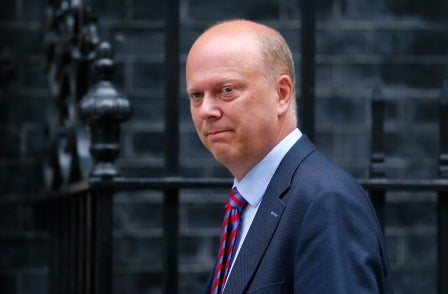
Chris Graylng
Leader of the House of Commons Chris Grayling (pictured) became the the poster boy for the haters of Freedom of Information when he revealed in October what some politicians really think of the act.
He said: "The truth is the Freedom of Information Act is something this Government is committed to but we want to make sure it works well and fairly, it cannot be abused, it cannot be misused.
"It is on occasions misused by those who use it effectively as a research tool to generate stories for the media.
"That isn't acceptable."
Jeremy Heywood
Cabinet Secretary Jeremy Heywood deserves to be on the naughty step with him. It is widely thought that the current bid to water down FoI was dreamed up by him.
The Independent Commission on Freedom of Information is set to report in the New Year. It is widely feared that it will recommend fees for requests and new restrictions on the act making it easier for public authorities to reject questions.
Olswang/The Guardian legal department
Who breaks a butterfly on a wheel? The jackbooted enforcers of The Guardian's brand identity, that's who.
In July Press Gazette reported that digital magazine the Martial Arts Guardian was facing the threat of legal action from The Guardian after its editors attempted to trademark the name.
Dire legal consequences were threatened by lawyers Olswang who apparently feared the two titles would be mixed up.
As this picture shows, the two do not seem to have much in common.
 Dylan Jones
Dylan Jones
What journalist hasn't made the odd booboo? But GQ's Dylan Jones makes it onto the list nonetheless for his legal howler of the year, nearly de-railing the trial of the century.
The Contempt of Court Act contains some grey areas, but sending an outspoken polemicist in to write a colour piece about a live trial does not lie in one of them.
Michael Wolff's comment piece published after a day or two hanging out at the hacking trial, and published while the trial was in progress, was found to be "very seriously prejudicial" and landed GQ with a hefty fine. A mistrial was avoided thanks to the fact that the issue was withdrawn from sale and pulped before any jurors could read it.
Katie Hopkins
The reality TV star wrote a rather unpleasant piece for The Sun about African migrants in April which, in the light of subsequent events, began to look even more crass. She left The Sun a few months later to join Mail Online.
Birmingham Police and Crime Commissioner spokesman Richard Costello
The Midlands policing watchdog found itself under investigation this year by dogged Birmingham Mail investigative journalist Jeanette Oldham. She uncovered some dubious hiring practices and questions over the awarding of contracts.
Its response was a novel one. PR Richard Costello banned her from asking further questions instead insisting future queries were tabled via Freedom of Information Act requests (which as we all know provide unwilling public authorities with ample opportunities to obfuscate and delay).
Richard Desmond
UK journalism's answer to Darth Vader is a regular on our seasonal naughty list and this year he makes the cut for the shameless way he used his national newspapers titles to publicise his autobiography.
In April, news that a newspaper publisher had written a book warranted coverage on pages one, two and three of the Daily Express.
Lee Power
Football is, they say, a gentleman's game played by ruffians – and run by idiots.
This year various football clubs have sought to ban journalists because of unfavourable coverage.
But Swindon Town, chaired by Lee Power, went one step further.
After banning local paper the Swindon Advertiser from press conferences the club indicated that other media would be getting the same treatment and media coverage would instead be going out via the Fanzai app centring around coverage provided by the club's own 'in-house journalist'.
Andrew Mitchell
Most people who, having called a policeman a "fucking pleb", found themselves in hot water would probably apologise profusely and then lie extremely low.
Not Andrew Mitchell MP. He sued The Sun for reporting the fracas.
Thankfully the High Court sided with The Sun in November and ruled that Mitchell probably did say the offending words – but not before three police officers had lost their jobs (over alleged involvement in leaking the information) and three journalists had had their phone records hacked by police investigating the source of the story.
Tim Yeo
Like Andrew Mitchell, fellow Tory MP Tim Yeo didn't know when to stop digging. He was caught on tape apparently showing a willingness to use his parliamentary influence to further the interests of a foreign energy company.
Again, rather than apologise and devote himself to good works, Yeo decided to instead claim in court that the whole thing had been made up. Unfortunately, with the whole encounter with undercover journalists caught on tape his was a difficult case to prove. Mr Justice Warby simply didn't buy Yeo's defence claim that he wasn't interested in money:
Email pged@pressgazette.co.uk to point out mistakes, provide story tips or send in a letter for publication on our "Letters Page" blog
